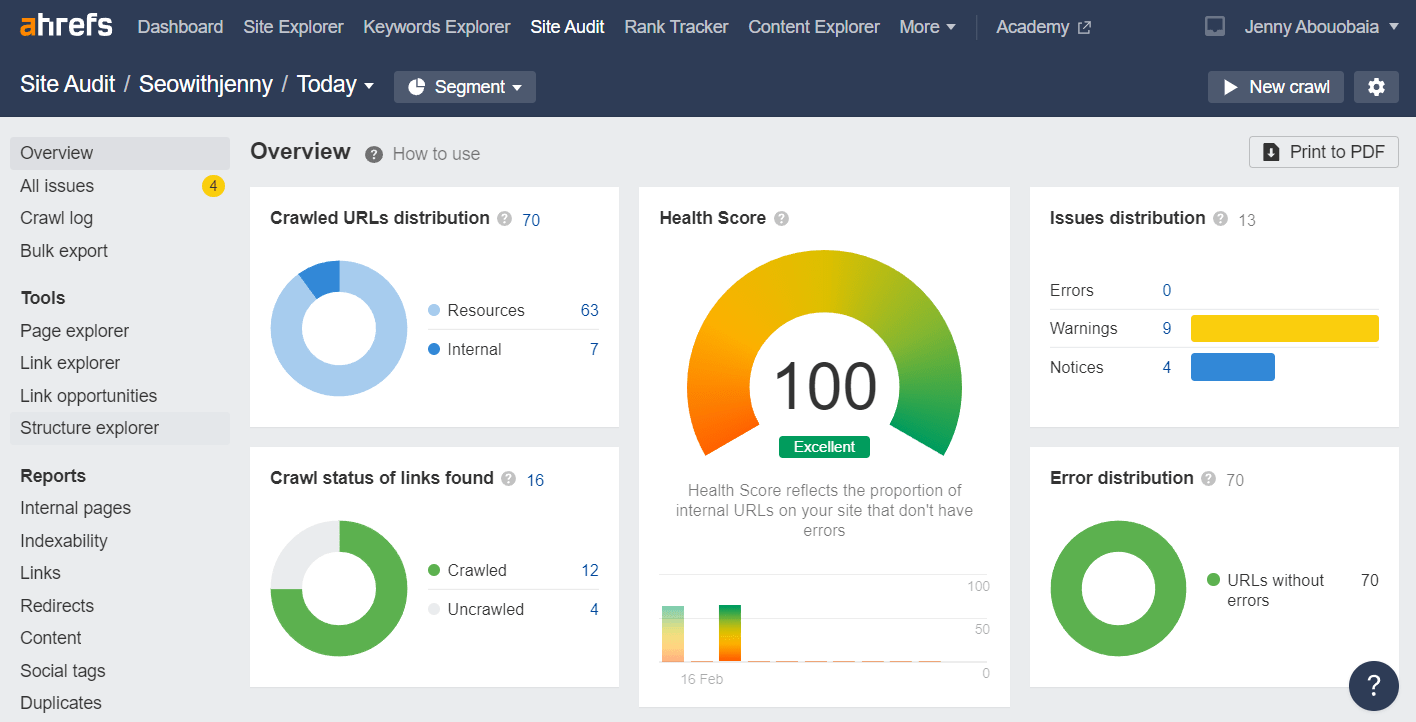Insights into today’s SEO landscape, from the value of brand authority to the SERPs’ evolution and why AI-powered search demands new skills.
SEO is far from dead – it’s simply changed beyond recognition. To stay relevant, SEOs must adapt to these shifts, expand their skillsets and embrace new technologies.
This article outlines 13 hard-hitting truths about modern SEO, revealing the realities every SEO professional needs to know to stay ahead.
These insights are intended to challenge your current approach, pushing you to rethink strategies that may no longer serve you.
1. Content-level SEO is not enough
Traditional content and website-level SEO tactics like page speed, keyword optimization and link building alone will no longer succeed. SEO now has three tiers:
- Content level.
- Content creator level.
- Website publisher level.
You must continue to work on traditional content-level SEO, but you will fail if you don’t upskill and apply all three tiers of modern SEO.
The who behind the content is now key. Optimizing the creator and publisher entities, including their E-E-A-T credibility and topical authority.
2. DA-based links are only a tiny piece of the puzzle
While links from websites with powerful domain authority (DA) remain helpful, their direct impact on SEO performance is dwarfed by other credibility signals.
Google assesses many other signals to judge credibility, such as:
- Mentions.
- Entity-to-URL relationships.
- Topic-to-URL relationships.
- Content creator credibility.
- Website publisher credibility.
- The relatedness of your page to others.
If you overlook these factors or rely too heavily on traditional DA link strategies, your results will likely fall short.
3. Keyword quantity simply doesn’t matter
Stop relying on keyword counts to boost rankings.
Instead, focus on key elements like:
- User intent.
- Vocabulary.
- Context.
- Entities.
- Relationships.
- Query sequences.
Keywords can still inspire your strategy, but use them thoughtfully and shift your attention to multimedia content that aligns with each stage of the buyer’s journey.
Keep your messaging consistent, clear and always on-brand across all content types.
4. Written content is declining
Written content is steadily losing ground as Google and Microsoft Bing increasingly prioritize multimedia elements like videos, images, Knowledge Panels and generative AI in their search results.
As AI becomes better at analyzing and presenting multimedia content, traditional text-based content is taking a back seat in the SERPs.
5. Traditional blue link ranking is redundant
For decades, ranking in the blue links has been central to SEO strategy, relying heavily on written content, keywords and links.
Yet these traditional tactics have steadily dropped in priority.
They still serve as the foundation of the SERP, as confirmed by representatives from both Bing and Google.
However, their impact on visibility and traffic has been diluted by the rise of SERP features, knowledge elements and the steady evolution of search.
With the integration of generative AI, blue links are becoming even less relevant for achieving meaningful traffic and visibility.
With the introduction of Bing’s Deep Search and Google’s AI Overviews, blue links now carry value primarily through what I call “implicit ranking.”
In implicit ranking, the search engine analyzes multiple results based on a query and combines them into a single, summarized outcome.
This process happens behind the scenes, making it nearly impossible to measure or control.
Bing’s Deep Search already demonstrates this approach in action, signaling a shift in how search results are presented.
6. You can’t hide from on-SERP SEO
If you haven’t embraced on-SERP SEO, now is the time to start. It’s far more than a buzzword – it’s an essential strategy that’s here to stay.
On-SERP SEO shifts the focus from generating clicks to maintaining consistent brand visibility and narrative throughout the acquisition funnel.
Achieving this level of visibility requires mastering SEO for both on-site and off-site content.
7. Websites won’t matter (much)
Websites are no longer the primary gateway to online visibility.
Instead, brands are gaining dominance across various channels, including social media, review platforms, video and traditional PR mentions.
While your website remains the central hub and ultimate destination for your digital marketing and SEO, it’s essential to expand your focus beyond the website itself.
Over time, it will become less visible in search results and assistive AI platforms, requiring a broader, multi-channel approach to maintain brand visibility.
8. Brand is boss
Google’s understanding of your brand identity now outweighs traditional content strategies focused on keywords and links.
It evaluates entities – whether a corporation, person or product – and ranks results based on how relevant the content is to these entities rather than simply counting words and links.
A clear sign of this shift is when Google recognizes your brand name and displays it in the SERP.
If it doesn’t recognize the brand, it will only show the domain, highlighting that the website is a weaker proxy for brand understanding.
9. Schema markup is passé
Google and Bing have moved away from schema markup due to its inconsistent and often manipulative implementation across websites.
Much like the meta keywords tag of the past, schema markup is frequently misused in attempts to game the algorithm.
Neither search engine is investing in expanding its support for Sschema beyond the basic types and attributes they currently recognize.
Instead, both focus on extracting information directly from pages through:
- Advanced language analysis (i.e., small and large language models).
- HTML5 elements like tables, lists and headings.
The future of SEO lies not in explicit semantics like schema markup but in implicit semantics. Think clear, on-page content that is consistently validated by multiple trusted sources.
10. Entity optimization is foundational but not as simple as you think
Entity optimization goes far beyond simply adding schema markup to webpages or obtaining a Knowledge Panel for a person or corporation – it’s just the beginning.
True entity optimization involves creating a highly confident understanding of the entity, which is essential for search algorithms.
This confidence is often overlooked but is crucial for search engines to accurately grasp every attribute of the entity and its relationships with other entities, such as persons, corporations, products, services, webpages, books, topics and cohorts.
To build this understanding, you must create a detailed and accurate network of relationships and attributes for your entity.
Maintaining this confidence means ensuring that this web of relationships remains stable as your digital footprint evolves over time.
Additionally, you must ensure that your representation of related entities aligns with their actual attributes and relationships, reinforcing the interconnectedness across the web.
11. Credibility is about N-E-E-A-T-T, not links
Google is increasingly capable of identifying the creators of content and the corporations that publish it.
As a result, it evaluates and applies credibility signals related to notability, experience, expertise, authoritativeness, trustworthiness and transparency (N-E-E-A-T-T) across three levels:
- The content itself.
- The content creator.
- The content publisher.
12. You cannot ignore conversational assistive search
People now rely on both traditional search and conversational assistive interfaces.
This means your SEO strategies must adapt to the conversational and multimodal nature of platforms like ChatGPT, Perplexity and SERP features such as AI Overviews and Bing generative search.
Conversational, multimodal search is the future.
Fabrice Canel from Bing highlights the “bridges” between these platforms that move users seamlessly from one to another, depending on the task.
For instance:
- ChatGPT now integrates Bing search.
- Bing answers follow-up questions with generative AI.
- AI Overviews dominate the top of Google’s SERP.
- Google’s new Learn About experiment pushes multimodal search even further.
This shift is happening now, so you must optimize for these new platforms today before it’s too late.
13. Think beyond Google: Diversify your SEO strategy
Supply creates its own demand.
Assistive chatbots haven’t replaced search. They’ve expanded the ways we can leverage information gathered from the web, using algorithms to solve user problems.
As AI transforms the search and assistive engine landscape, Google’s dominance is waning.
AI-powered on-SERP features (i.e., Google AI Overviews and Bing generative search), along with off-SERP platforms (e.g., ChatGPT, Perplexity, Meta, Alexa, Siri, etc.), are becoming crucial for reaching audiences.
With billions of users across these platforms, ignoring them would be a missed opportunity.
This shift to a conversational, multimodal, and multichannel experience requires optimizing your content, corporate brand entities and key subject matter experts for all the BigTech algorithms.
Furthermore, AI bots are integrating more deeply into everyday tools like CoPilot+ PCs, Zapier, Canva, Gmail and Excel – creating new opportunities for those with a broad, beyond-Google SEO approach.
Critical SEO shifts you can’t ignore in 2025
Search has expanded far beyond Google SERPs, and this shift is irreversible. While content-level SEO remains essential, it’s no longer sufficient alone.
As AI increasingly integrates into everyday platforms and tools, Google’s dominance is diminishing. Search now spans multiple modalities and channels.
People are engaging in search, research and assistance across text, voice, images and video using a variety of platforms.
Although the number of ways to engage potential customers has grown, Google and Bing still control the web’s indexing, keeping things relatively straightforward.
By maintaining strong, consistent content online, you can influence how search engines interact with your brand.
However, relying solely on Google is a mistake; Bing, which powers ChatGPT and many of Microsoft’s platforms, also plays a crucial role.
To thrive in today’s landscape, you must implement a universal strategy that optimizes your content, brand entities and subject matter experts for all the major search algorithms.
Doing so will ensure your survival and position you for success, as these new technologies offer vast opportunities for visibility and customer acquisition across the entire funnel.
In my next article, I will present a practical 13-point roadmap for navigating the future of AI-driven search and assistive engines, providing actionable steps to help you adapt to SEO’s new reality and capitalize on the evolving digital ecosystem.
Credit: Source link




